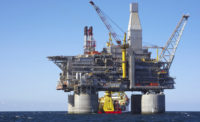BP has announced it is selling all of its Alaska operations to Hilcorp, a privately-owned company with a troubled safety and environmental track-record.
The $5.6 billion sale includes BP's stakes in the Trans Alaska Pipeline and the Prudhoe Bay oil field, one of the nation's largest and once its most productive oil field, which BP currently operates.
Hilcorp is a relatively new player in Alaska's oil and gas industry. The Houston-based company's business strategy has been to purchase older oil and gas fields and try to make them profitable—a track-record experts say it hopes to repeat with its new acquisitions.
Since entering Alaska in 2012, Hilcorp has rapidly expanded across the state, from the underwater gas fields in Cook Inlet to the oil fields along the North Slope.
As it has done so, it has amassed a long list of safety and environmental violations. Among the most egregious incidents: three workers were nearly killed in an accident in 2015; a methane leak from an underwater pipeline was not stopped for months in 2017; and in late 2018, an oilfield worker was killed at Milne Point on the North Slope.
BP is selling its Alaska assets in order to shift its business toward more profitable regions. The company has a goal of divesting $10 billion by 2020.
BP's record in Alaska is not pristine, either. In 2017 alone, the company had at least 27 accidents including five that put workers' lives at risk. That resulted in an effort to "reset" the safety culture there, according to internal documents found in an investigation by Buzzfeed.
Larry Persily, a former federal coordinator for Alaska gas projects, said many Alaskans still have a soft spot for the company. "BP has been here from the dawn of time, and for us time dawned when we found oil," he said.
Compared to BP's 60 years in the state, Hilcorp's presence represents just a blip on the timeline.
"Some people have said they feel the state needs to keep a closer eye on Hilcorp," Persily said. "They don't have decades of experience here. This is a big bite for them to chew on."
Should anything go horribly wrong—as it did for BP with the Deepwater Horizon spill—Hilcorp also doesn't have the deep pockets that BP does to pay to rectify the situation.
"I think the majors have played a positive role in fostering safer workplaces in Alaska," said state legislator Zack Fields. "I hope that Hilcorp departs from previous practices and really embraces what traditionally has been the big three's record on safety."
Fields said BP had also been more forthright about the threat from climate change. "I hope that Hilcorp embraces that kind of recognition of the very dire threat climate change poses to the state of Alaska," he said.
Source: Sabrina Shankman, InsideClimate News


